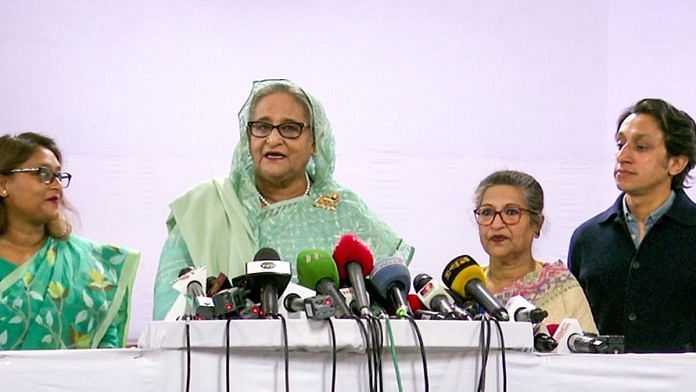On Sunday, democracy in Bangladesh behaved somewhat like Schrödinger’s cat – dead and alive at the same time. Perhaps a split-second image and the ticker that ran below it on a local TV channel exemplified this best. While the TV screen showed a deserted primary school doubling as a polling booth, the ticker said people were coming out to vote in large numbers for the 12th national elections in Bangladesh.
Maybe it was an oversight, or the person in charge of the ticker had a wicked sense of humour, but the mood of the nation in the run-up to the elections was also divided. Depending on who you asked, Bangladeshis were either content with the outcome of Sunday’s results or dejected even before they came out. Both sets had no doubt Sheikh Hasina would be back as the prime minister.
When the Chief Election Commissioner of Bangladesh, Kazi Habibul Awal, announced on Sunday evening that the average voter turnout across the country was around 40 per cent, there was a willing suspension of disbelief among Bangladeshis who wanted Hasina back. “Most people in Bangladesh have become radicals, irrespective of their political leanings. There will be anarchy if Hasina does not come back,” the 61-year-old editor of Blitz magazine, Salah Uddin Shoaib Choudhury, told ThePrint a day before the counting of votes. And herein lies the rub.
Why only Hasina?
The problem with Choudhury’s argument – and he is not the only one in Dhaka making it –is that Sunday’s election was reduced to almost a farce designed to bring Hasina back to power. The principal opposition party, the Bangladesh Nationalist Party (BNP) boycotted the polls. The party had argued that free and fair elections in the country cannot be held under the current government and that Hasina should step down before polls and let a caretaker government conduct the elections. Hasina rejected the offer. The largest Islamist party, the Bangladesh Jamaat-e-Islami, was barred by the courts from participating in the elections. With the BNP and Jamaat out of the electoral fray, there was no real opposition left for Hasina’s Awami League.
Most of the independent candidates, totalling 437 in number, were Awami League leaders who were denied nomination by the party. Interestingly, even as they fought as independents, they did not leave Awami League. Moreover, there is always the possibility of them coming back into the party fold post-election.
“In a never-before-seen tactic, the Awami League also instructed its grassroots to support aspirants from other little-known parties that were formed recently, allegedly with government blessings. The Awami League also formed dedicated teams across the country to bring as many voters as possible to the polling centres to ensure high turnout in efforts to garner international support,” The Daily Star wrote.
So, in a way, this election was about the Awami League fighting the Awami League. And Awami League won.
Hasina backers will say that the PM has fast-tracked Bangladesh’s growth story – which is true to a large extent. With impressive GDP numbers, state-of-the-art infrastructure projects and welfare schemes, she has promised her citizens a smart Bangladesh that is technologically, societally and infrastructurally better. Hasina should also be rightfully credited for creating a Bangladesh where minorities feel safer than they did during the BNP-Jamaat rule.
Memories of the atrocities that Hindus bore during the BNP-Jamaat tenure in 2001 are still fresh in the minds of Bangladesh’s minorities. With the Jamaat openly advocating for Sharia law in the country, the electorate indeed has little option but to turn to Hasina. The BNP and Jamaat challenge the very idea of a secular Bangladesh and threaten to take it back to its East Pakistan origin story.
But the “if not Hasina, who?” dilemma has given unchallenged power to the prime minister for 15 years. There have been serious allegations by civil society and local and international rights bodies of suppression of free speech, crackdown on opposition parties and widespread corruption. “The BNP has accused Prime Minister Sheikh Hasina’s government of a major crackdown targeting its supporters and opposition politicians on what they say are trumped-up charges in the lead-up to the polls. They claimed that over 20,000 of their members have been jailed in recent months,” the Associated Press reported. Even if the figure cannot be fact-checked, this is hardly a tenable situation.
Also read:
America & the threat of Arab Spring
The United States came down strongly on the Hasina administration in the lead-up to the elections, imposing sanctions on anyone they felt hindered the process of free and fair polls. US Ambassador to Bangladesh, Peter D Hass, met opposition leaders, visited the election commission office time and again and imposed sanctions on politicians and members of the armed forces. The extreme interference became fodder for jokes in Dhaka’s political circles, where they labelled Hass a de facto candidate in the elections.
Whatever America’s game plan may be about Bangladesh, an opposition-mukt political space will only make things difficult for Hasina going forward. There are rumours in Dhaka’s political circles that the US will impose sanctions on Bangladesh’s garment exports and disrupt the country’s growth story. America apart, the very sense that national elections in Bangladesh are now fought between Awami League and Awami League may eventually take Bangladeshi society to a breakpoint.
“In case the USA is not satisfied with the results of the people’s vote, attempts to further destabilise the situation in Bangladesh along the lines of the Arab Spring are likely,” Andrei Shutov, member of the Russian Central Election Commission and observer for Bangladesh polls, told ThePrint over phone from Dhaka.
It may not be in Hasina’s immediate political interests to make space for a viable opposition in the country, but an Arab Spring engineered by external forces should definitely worry her.
Deep Halder is an author and journalist. He tweets @deepscribble. Views are personal.
(Edited by Zoya Bhatti)



